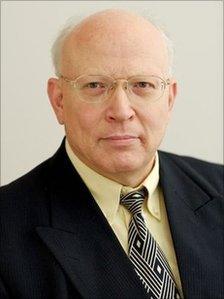Foreign language assistants blow for Scottish schools
- Published

There are native speakers from 15 different nations currently working in local authority-run schools
More than half of all foreign language assistants in Scottish state schools are being axed following council budget cuts, BBC Scotland has learned.
A survey of Scottish councils found at least 55 of the current 106 posts across the country are to go this year.
The biggest reduction is in Glasgow, where the council is to cut all 35 of its assistants to save £300,000.
The German consul general to Scotland said the impact of the cuts would be felt in years to come.
Native speakers from 15 different nations are used by Scottish primary and secondary schools to enhance modern language teaching and develop intercultural awareness.
They are selected by the British Council and are used in both state and private schools in Scotland.
But the number of assistants in state schools has plummeted in the past few years, largely as a result of local authority cuts.
'Tough decisions'
In 2009-10, there were 167 assistants in Scottish state schools. In the next academic year, there could be fewer than 50.
Glasgow City Council said it had been forced to make tough decisions in the current financial climate.
A spokeswoman added: "The language assistants are an enhancement to provision in Glasgow schools."
Argyll and Bute Council confirmed it would axe six posts this year, saving £60,000, while Aberdeenshire Council is to cut 14 assistants.
Out of 23 councils who responded to BBC Scotland, only five - Edinburgh, Orkney, East Renfrewshire, Angus and Inverclyde - said they planned to maintain or create new posts this coming year.
Orkney Council said it wanted to continue using FLAs as they were "integral to modern language teaching".
The German consul general to Scotland, Wolfgang Moessinger, told BBC Scotland's news website: "This is too important an issue to leave to the councils - these are decisions that have to be taken at a national level.
"The decline in the number of foreign language assistants is just a symptom. The problem lies behind the decision to reduce the numbers - they are seen as an easy target when it comes to cuts."

Mr Moessinger said the impact of cuts would be felt in years to come
However, Mr Moessinger said he remained optimistic that more emphasis would be placed in future on modern languages in Scotland.
He added: "I sense a growing awareness within Scotland that this decline which we are experiencing is not good for Scotland, and that more and more people are starting to think seriously about what can be done - against a backdrop of cuts - to halt this decline and reverse it."
The British Council Scotland said it was disappointed at the falling numbers.
A spokesman said: "In an increasingly international world, foreign language assistants provide a unique opportunity for Scottish students to experience different languages and cultures in the classroom.
"It is obviously disappointing that fewer students will have access to these experiences next year but we recognise the current funding pressures local authorities are under.
"British Council Scotland will continue to work with Scottish schools across a full range of projects to offer as many international learning opportunities as possible."
'Absolutely important'
Teachers' leaders said the reduction in posts was a "real issue of concern".
An EIS spokesman said: "This is a case of putting budget savings ahead of the quality of educational experience for pupils.
"FLAs allow pupils to be exposed to native speakers who speak their language the way it is intended to be spoken. Learning a language is absolutely important as we attempt to grow our economy through trade with Europe and further afield."
Education Secretary Michael Russell said foreign language assistants and visiting teachers from overseas made "an important contribution to our schools in supporting the teaching of modern languages".
He added: "I will shortly be considering the reports of the Modern Languages Excellence Group and the Donaldson review [into teaching standards] and I want to find ways to build on our current strengths rather than diminish them.
"I hope local authorities will be mindful of the importance of languages, but I know they are facing tough decisions even though our funding settlement for the coming year maintains the council's share of overall spending despite the damaging cuts coming from Westminster."
- Published13 September 2010